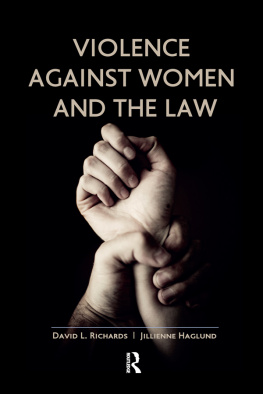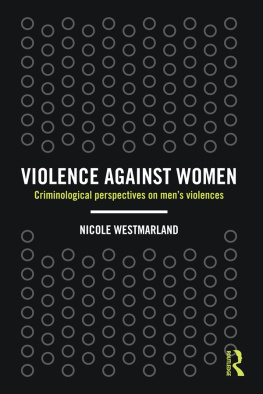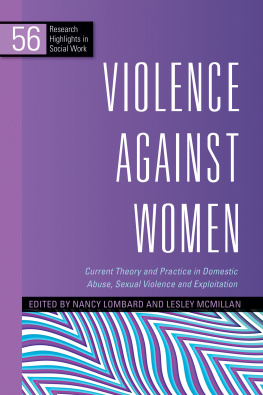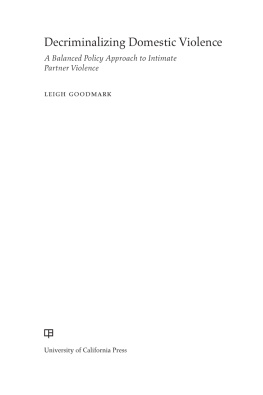VIOLENCE AGAINST WOMEN
AND THE LAW
International Studies Intensives (ISI) is a book series that springs from the desire to keep students engaged in the world around them. ISI books pack a lot of information into a small spacethey are meant to offer an intensive introduction to subjects often left out of the curriculum. ISI books are relatively short, visually attractive, and affordably priced.
Titles in the Series
The Rules of the Game: A Primer on International Relations, Mark R. Amstutz
Development Redefined: How the Market Met Its Match, Robin Broad and John Cavanagh
Protecting the Global Environment, Gary C. Bryner
A Tale of Two Quagmires: Iraq, Vietnam, and the Hard Lessons of War, Kenneth J. Campbell
Celebrity Diplomacy, Andrew F. Cooper
Global Health in the 21st Century: The Globalization of Disease and Wellness,
Debra L. DeLaet and David E. DeLaet
Terminate Terrorism: Framing, Gaming, and Negotiating Conflicts, Karen A. Feste
Watching Human Rights: The 101 Best Films, Mark Gibney
The Global Classroom: An Essential Guide to Study Abroad, Jeffrey S. Lantis and Jessica DuPlaga
Democratic Uprisings in the New Middle East: Youth, Technology, Human Rights,
and US Foreign Policy, Mahmood Monshipouri
Sixteen Million One: Understanding Civil War, Patrick M. Regan
Violence against Women and the Law, David L. Richards and Jillienne Haglund
People Count! Networked Individuals in Global Politics, James N. Rosenau
Paradoxes of Power: US Foreign Policy in a Changing World, David Skidmore
Global Democracy and the World Social Forums, Second Edition, Jackie Smith and Marina Karides et al.
From Jicama to Jackfruit: The Global Political Economy of Food, Kimberly Weir
Governing the World? Addressing Problems without Passports, Thomas G. Weiss
Forthcoming in the Series
A Humbled Superpower: US Foreign Policy and Possibilities of Contrition, Loramy Gerstbauer
The New Warfare: Rethinking Rules for an Unruly World, J. Martin Rochester
International Relations as Negotiation, Brian R. Urlacher
Myth and Reality in International Politics, Jonathan Wilkenfeld
Spirits Talking: Conversations on Right and Wrong in the Affairs of States, Stephen D. Wrage
VIOLENCE AGAINST WOMEN
AND THE LAW
DAVID L. RICHARDS AND JILLIENNE HAGLUND
First published 2015 by Paradigm Publishers
Published 2016 by Routledge
2 Park Square, Milton Park, Abingdon, Oxon OX14 4RN
711 Third Avenue, New York, NY 10017, USA
Routledge is an imprint of the Taylor & Francis Group, an informa business
Copyright 2015, Taylor & Francis.
All rights reserved. No part of this book may be reprinted or reproduced or utilised in any form or by any electronic, mechanical, or other means, now known or hereafter invented, including photocopying and recording, or in any information storage or retrieval system, without permission in writing from the publishers.
Notice:
Product or corporate names may be trademarks or registered trademarks, and are used only for identification and explanation without intent to infringe.
Library of Congress Cataloging-in-Publication Data
Richards, David L. (College teacher), author.
Violence against women and the law / David L. Richards and Jillienne Haglund.
pages cm. (International studies intensives book series)
Includes bibliographical references and index.
ISBN 978-1-61205-147-5 (hardcover : alk. paper)
ISBN 978-1-315-63129-5 (ebook)
1. WomenCrimes against. I. Haglund, Jillienne, author. II. Title.
K5191.W65R53 2015
345.025082dc23
2014033393
ISBN 13: 978-1-61205-147-5 (hbk)
ISBN 13: 978-1-61205-148-2 (pbk)
CONTENTS
Political, Economic, and Social Determinants of Domestic
Gender-Based-Violence Policy
In the summer of 2008, we had an idea to create a unique dataset on violence against women. We created it and then spent the next six years repeatedly tearing it down and rebuilding it to get the data as correct as we could. Peoples interest in and/or consternation toward the stories our data told gave us the idea for this book. Along the journey, we benefted greatly from the support and criticism of a wide range of people. This is a better book for their counsel. We also worked with a number of research assistants who gave more to the project than we could possibly give back to them, and for their devotion and hard work we are eternally grateful. Well certainly forget someone, but in the following paragraphs we try to thank as many as possible.
First, we want to thank Jennifer Knerr at Paradigm, and ISI series editors Mark Boyer and Shareen Hertel, for supporting us in writing the book we wanted to write, for their counsel on strengthening the final product, and for hanging in there with us during the final reconstruction of the dataset. We also wish to thank the anonymous manuscript reviewers for forcing us to provide a more clear statement of what we wanted to say.
Next, we give our sincere thanks to the many research assistants who helped us code, test, and recode our data. First, special thanks go to Celia Guillard and Stephen Petkis of the University of Connecticut (UConn), who went above and beyond in their assistance with the final data product. Also from UConn we wish to thank Kathleen Adams, Shaznene Hussain, David Schwegman, Jonathan Sykes, and Jack Zachary for all their hard work and dedication to getting things right. From Florida State University, we would like to thank Taylor Lee and Richard Farinas for their fantastic work on the project.
We wish to thank the organizers and participants at the conferences and workshops where we presented our data, methodology, and fndings. We learned so much from our interactions with you. These forums included those sponsored by the American Political Science Association, the Department of Political Science at Emory University, the Economic and Social Rights Research Group at the Human Rights Institute at UConn, the International Human Rights Law Institute at DePaul University College of Law, the International Network on Quantitative Methods for Human Rights and Development, and the Protection Project at the Johns Hopkins University School of Advanced International Studies.
A special thanks to the kind folks at UN Women for taking the time to speak with us at length and in person about their work and their own data.
This book is also better off due to advice from K. Chad Clay, David Davis, Natalie Hudson, Manisha Desai, Amanda Kuppers, Kathy Libal, Mohamed Mattar, Heather Turcotte, and Richard Wilson.
Last, but not at all least
David Richards wishes to thank his marvelous wife, Megan, for putting up with him throughout the writing process. David dedicates his portion of the book to his daughter Emily Elizabeth, with wishes that the world she meets is kinder than the one described in these pages. He owes great gratitude to Mandy Morrill, whose time as a domestic violence caseworker in southwest Missouri gave him an unvarnished view of domestic violences means and costs, as well as a quick education in the limits of the law in providing protection and justice to victims of sexual violence. David also is indebted to the Human Rights Institute at the University of Connecticut for a faculty fellowship in 2012 that allowed him to complete a good deal of his contribution to the book. Finally, thanks to Roscoe, of course.










